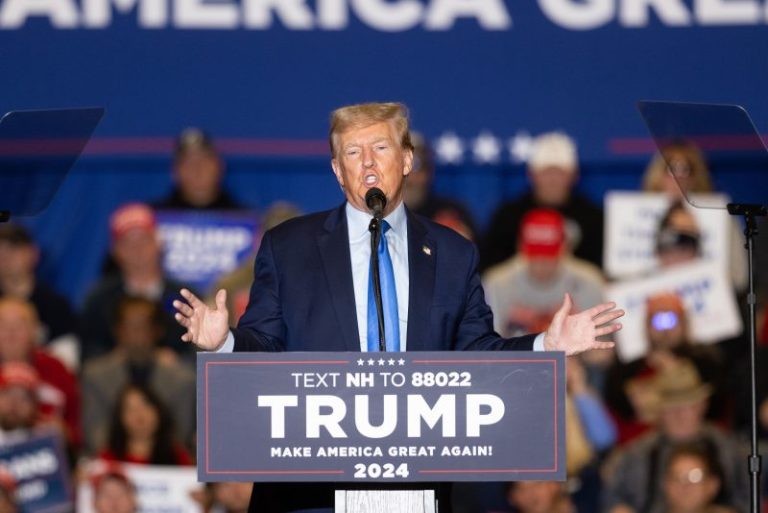The White House, President Biden’s 2024 campaign and some prominent Republicans on Monday criticized former president Donald Trump for calling his political opponents “vermin” and more dangerous than foreign enemies, comments historians said mimic the language used by authoritarian leaders.
The remarks came during Trump’s campaign speech Saturday in Claremont, N.H., and in a post on social media.
“We pledge to you that we will root out the communists, Marxists, fascists and the radical left thugs that live like vermin within the confines of our country that lie and steal and cheat on elections,” Trump said in New Hampshire, repeating the false claim that the 2020 election was stolen. “They’ll do anything, whether legally or illegally, to destroy America and to destroy the American Dream.”
White House spokesman Andrew Bates explained he wouldn’t comment on the 2024 campaign but said in a statement Monday, “Using terms like that about dissent would be unrecognizable to our founders, but horrifyingly recognizable to American veterans who put on their country’s uniform in the 1940s.”
Ruth Ben-Ghiat, a historian at New York University, said in an email to The Washington Post that “calling people ‘vermin’ was used effectively by Hitler and Mussolini to dehumanize people and encourage their followers to engage in violence.”
It was a point Biden’s reelection campaign spotlighted Monday when it shared on social media a clip of CNN host Dana Bash echoing The Post’s reporting with her own: “We just need to say, the term ‘vermin’ was really effectively used by Adolf Hitler and by Mussolini, to dehumanize people and encourage their followers to go after their opponents.”
Steven Cheung, a spokesman for Trump’s campaign, repeated an earlier statement to defend the former president’s comments. “Those who try to make that ridiculous assertion are clearly snowflakes grasping for anything because they are suffering from Trump Derangement Syndrome and their sad, miserable existence will be crushed when President Trump returns to the White House.”
In the Saturday speech, Trump also called himself a “very proud election denier,” and said “the threat from outside forces is far less sinister, dangerous and grave than the threat from within. Our threat is from within. Because if you have a capable, competent, smart, tough leader, Russia, China, North Korea, they’re not going to want to play with us.”
Trump’s remarks drew stark condemnation, and warnings, from historians and politicians across the political spectrum.
Former Republican congresswoman Liz Cheney of Wyoming — who served as co-chair of the House select committee that investigated the Jan. 6, 2021, attack at the U.S. Capitol and the efforts to overturn the election results — said on X, formerly Twitter, that Republicans who refused to denounce Trump’s remarks are “appeasing this dangerous man.”
Cheney shared a video of Ronna McDaniel’s Sunday appearance on NBC’s “Meet the Press,” in which the Republican National Committee chairwoman declined to comment on what Trump said. Cheney criticized McDaniel’s refusal to condemn Trump “for using the same Nazi propaganda that mobilized 1930s-40s Germany to evil, it’s fair to assume she’s collaborating,”
“It’s unfortunate yet not shocking that Liz Cheney is parroting DNC talking points,” RNC spokesman Anna Kelly told The Post in response to Cheney’s comments.
Michael Steele, a former RNC chairman, wrote on social media that, “Trump calls his enemies ‘vermin’ and wants to end the ‘Radical Left Lunatics.’ Don’t dismiss his fascist reference while also noting it’s not the Left who have testified against him, it’s the Conservatives who supported him. HE is ‘the threat from within.’”

